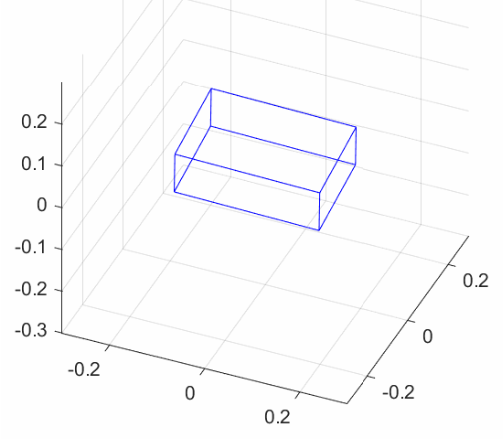刚体转动数值模拟(Matlab)
贡献者: addis
这里给出使用 4 阶龙格库塔法模拟刚体绕固定点转动的 Matlab 代码。程序中给出的默认参数用于模拟一个初始静止的长方体受到一个 $(1,1,1)$ 方向的大小为 $0.05$ 的恒力矩时的加速转动。
未完成:应该渲染得更立体,打个灯光
图 1:模拟结果,动画见这里。
为了验证数值解的正确性,我们在生成动画之前用 verify 函数验证动能定理和角动量定理,详见图 2 。
图 2:验证动能定理(图 1),角动量定理(图 2-4)和角速度的三个分量(图 5)。图 1-4 中蓝线是动能和角动量,红线是做功和冲量矩。
代码 1:rigBdRot.m
% 刚体绕固定点转动的数值计算
function rigid_body_rotation
close all;
% === 设置长方体 ===
a = 0.3; b = 0.2; c = 0.1; M = 1; % 边长和质量
I0 = M/12 * diag([b^2 + c^2, a^2 + c^2, a^2 + b^2]); % 惯性张量
w0 = [0; 0; 0]; % 初始角速度
q0 = [1; 0; 0; 0]; % 初始朝向(四元数)
tau = @(t) 0.05*[1; 1; 1]/sqrt(3); % 力矩函数
tmin = 0; tmax = 5; Nt = 201; % 时间网格
RelTol = 1e-6; % 微分方程精度
% ================
% 解微分方程
invI0 = inv(I0);
Y0 = [q0; w0];
f = @(t,Y)ode_fun(t, Y, I0, invI0, tau);
options = odeset('RelTol', RelTol);
[tt, Y] = ode45(f, [tmin,tmax], Y0, options);
t = linspace(tmin, tmax, Nt);
q = zeros(4, Nt); w = zeros(3, Nt);
for i = 1:4 % 四元数
q(i,:) = interp1(tt, Y(:,i), t, 'spline');
end
for i = 1:3 % 角速度
w(i,:) = interp1(tt, Y(:,i+4), t, 'spline');
end
% 验证角动量定理
verify(Y, tt, I0, tau);
% 播放动画
figure; hold on; grid on; axis equal; view(23, 36);
for it = 1:Nt
% 求位置
R = quat2mat(q(:,it));
clf; hold on; grid on; axis equal; view(23, 36);
axis([-1, 1, -1, 1, -1, 1]*a);
plot_cube(R, a, b, c);
title(['t = ' num2str(t(it), '%.3f')]);
% 画瞬时角速度
plot3([0,w(1,it)],[0,w(2,it)],[0,w(3,it)]);
drawnow();
% 取消注释可将每一帧保存为 png 图片(当前目录下)
% saveas(gcf, [num2str(it) '.png']);
end
end
% 微分方程求导函数
function dY = ode_fun(t, Y, I0, invI0, tau)
q = Y(1:4); w = Y(5:7);
q = q / norm(q);
R = quat2mat(q);
RT = R';
dw = R*invI0*RT*(tau(t) - cross(w, R*I0*RT*w));
dq = 0.5*quat_mul([0; w], q);
dY = [dq; dw];
end
% 两个四元数相乘
function out = quat_mul(q1, q2)
s1 = q1(1); v1 = q1(2:4);
s2 = q2(1); v2 = q2(2:4);
out = [s1*s2 - dot(v1,v2); s1*v2 + s2*v1 + cross(v1, v2)];
end
% 由四元数 q 求旋转矩阵 R
function R = quat2mat(q)
s = q(1); vx = q(2); vy = q(3); vz = q(4);
R = [1 - 2*vy^2 - 2*vz^2, 2*vx*vy - 2*s*vz, 2*vx*vz + 2*s*vy;
2*vx*vy + 2*s*vz, 1 - 2*vx^2 - 2*vz^2, 2*vy*vz - 2*s*vx;
2*vx*vz - 2*s*vy, 2*vy*vz + 2*s*vx, 1 - 2*vx^2 - 2*vy^2];
end
% 画长方体(只用一条线)
function plot_cube(R, a, b, c)
x = [-1, 1, 1, -1, -1, 1, 1, -1] * a/2;
y = [-1, -1, 1, 1, -1, -1, 1, 1] * b/2;
z = [-1, -1, -1, -1, 1, 1, 1, 1] * c/2;
P = R * [x; y; z];
order = [1, 2, 3, 4, 1, 5, 6, 7, 8, 5, 6, 2, 3, 7, 8, 4];
plot3(P(1, order), P(2, order), P(3, order), 'b');
end
% 验证角动量定理
function verify(Y, t, I0, tau)
Nt = numel(t);
L = zeros(3, Nt); w = L; % 解的角动量
Ek = zeros(1, Nt); W = Ek;
for it = 1:Nt
q = Y(it, 1:4); w(:,it) = Y(it, 5:7);
R = quat2mat(q);
L(:, it) = R*I0*R'*w(:,it);
Ek(it) = 0.5*dot(w(:,it), L(:, it));
if (it > 1)
W(it) = W(it-1) + dot(tau(t(it)), w(:,it))*(t(it)-t(it-1));
else
W(it) = Ek(it);
end
end
L0 = zeros(3, Nt); % 力矩积分的角动量
L0(:, 1) = L(:, 1);
for it = 2:Nt
L0(:, it) = L0(:, it-1) + ...
integral(tau, t(it-1), t(it), 'ArrayValued', true);
end
figure;
% 动能定理
subplot(5, 1, 1); ylabel E_k; hold on;
plot(t, Ek, 'r'); plot(t, W, 'b--');
% 角动量定理
for i = 1:3
subplot(5, 1, 1+i);
plot(t, L(i, :), 'r'); hold on;
plot(t, L0(i, :), 'b--');
end
subplot(5, 1, 2); ylabel L_x;
subplot(5, 1, 3); ylabel L_y;
subplot(5, 1, 4); ylabel L_z;
% 角动量
subplot(5, 1, 5);
plot(t, w); hold on;
ylabel 'w_x, w_y, w_z';
legend({'w_x','w_y','w_z'});
xlabel t;
end

